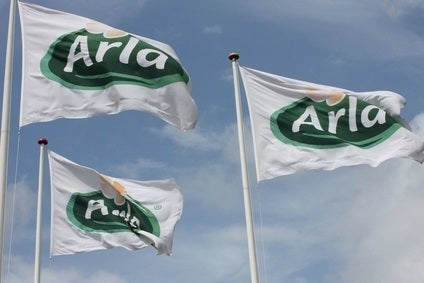
Arla Foods is looking at adding value to the UK liquid milk sector in a variety of ways, as shown by the product news it announced this week. As part of these efforts, the dairy giant is hoping to capitalise on the "macro-trends" shaping demand in the UK in order to kick-start "stalled" flavoured milk sales in the UK. Will the company's efforts pay off? Katy Askew reports.
Flavoured dairy drink sales are worth around GBP270m (US$403m) per annum in the UK and, although the sector is relatively small, it has been one of the fastest-growing areas of the dairy sector in recent years.

Discover B2B Marketing That Performs
Combine business intelligence and editorial excellence to reach engaged professionals across 36 leading media platforms.
Alongside that growth, flavoured milks also offer dairy processors some respite from the constant pressure on margins. Fierce competition between UK retailers and the pressure on pricing arising from the growth of the discount channel has forced white milk prices down to as low as GBP1 per four pints.
For these reasons, Arla Foods has expanded its presence in flavoured milk in the UK. Over the past two years, the company has made a series of moves in the category. In 2013, Arla launched Wing-Co but last year replaced it with the Danish brand Cocio. The company also manufactures Starbucks chilled lattes under licence.
However, the prospects for the sector are not as rosy as they once were. According to Nielsen data, last month, the flavoured dairy drinks category actually fell into decline. "Category growth has stalled," Gareth Turner, senior brand manager for Arla's UK business told attendees at the Canadean Dairy Innovation Summit in Dublin yesterday (21 April).
Part of the decline can be attributed to a lower level of promotional activity. Branded promotions have declined by 8% year-on-year, versus an increase in private-label promotional activity. This has helped to wipe value from the category, educating consumers to make purchase decisions based on price.

US Tariffs are shifting - will you react or anticipate?
Don’t let policy changes catch you off guard. Stay proactive with real-time data and expert analysis.
By GlobalDataTurner suggested other challenges include inconsistent and illogical positioning in store, with flavoured dairy drinks – a single serve on-the-go or impulse product – frequently sitting above the main dairy fixture.
A more significant hurdle to the category is consumer perceptions. Turner conceded UK shoppers view flavoured milks as "too sugary, too fattening or too childish".
While flavoured dairy drinks have come under pressure, Turner believes the situation is far from terminal. The dairy industry should capitalise on the "headroom" available for growth, he argued.
Penetration currently stands at just 3.5 out of every ten consumers. Of the consumers that do buy into the category, purchase frequency stands at an average of just eight times per year. Rather than seeing this as a cap on the appeal of flavoured dairy drinks, Turner characterised getting more consumers to buy them more frequently as an opportunity for dairy processors.
In order to bring new consumers into flavoured dairy drinks and increase purchase frequency, manufacturers should look to "need-based innovation", he continued. "For me, true need-based innovation has stalled. There is some great flavour-based innovation but we don't see much really new stuff coming out."
Turner continued: "I think we can increase category penetration by focusing on more need-based NPD… We drive usage by making products more relevant to more people and more consumption occasions."
Product development at Arla's flavoured dairy drinks business is focusing on four "macro-trends" the company believes will increase the relevance of its beverages. These are: health, indulgence, low-sugar and provenance.
In the arena of health, Turner said Arla is working on products that deliver nutrition from whole, minimally processed products. In indulgence, the group is working on adult flavoured milks. "There is loads of value to be extracted from this" in an area where consumers are willing to pay "any price", Turner argued. The company – alongside its competitor brands – has rolled out reduced sugar options in an effort to win the "great sugar debate". And in provenance Arla believes it can leverage its farmer-owned credentials to provide consumers with a compelling story about their products.
"How do you take those macro-trends and convert them into need states and then into category drivers and execution at the point of purchase? It is the million pound question," Turner said.
Indeed, if the innovation and branding hits the spot, these efforts could reap significant rewards and provide an avenue to growth outside the commoditised UK milk market.
On the other hand, get it wrong and it could represent a costly mistake because it requires a high level of investment. Changing consumer attitudes does not take place overnight and big-bang, category redefining innovation is hard to come by.
Innovation and changing consumer perceptions about a brand also require significant levels of investment. Given the small scale of the flavoured dairy drinks category, this cash can be hard to justify.
Turner's response is clear. To his mind, need led innovation and investments in branding are needed to rejuvenate the category in the long-term. "This is a more expensive way of driving the category than just promoting it, but I think it will lead to a more sustainable category."





